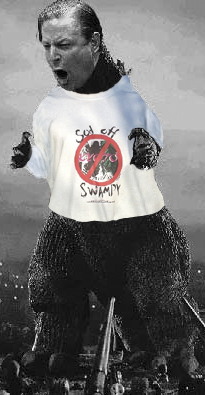Lest We Forget
In the midst of our national navel-gazing over granting non-citizens who try to murder hundreds of Americans the same ‘rights’ as those they tried to slaughter let’s not forget what real torture, real inhuman brutality looks like
Alistair Urquhart was just 20 when he was called up in World War II. For 60 years, he has remained silent about the relentless brutality he endured at the hands of the Japanese army. Now, he reveals the full horror of his 750 days as a Far East prisoner-of-war. Here, in our first extract of his compelling autobiography, we learn of his capture and enforced labour on the notorious ‘Death Railway’.
Read the whole thing. It’s horrifying and tough to get through, but it serves as a valuable reminder of what torture and depravity really are.

“The Bridge Over the River Kwai” is a good movie, but its relevence to the real happenings there is vacant. I wonder why they felt a need to include pictures from the movie? I’ve seen plenty of photos of the actual railroad and sketches by former prisoners detailing the brutality. Those would have been much more appropriate.
I had a distant cousin who survived the Bataan Death March and subsequent time as a Japanese POW — he never spoke about it. I can see why.
A friend of my dad’s was on the Bataan death march. He had an intense hatred of MacArthur.
That’s a ghastly story. I can’t believe he made it out alive.
I’ve never been able to understand why people wring their hands over Hiroshima and Nagasaki and completely ignore how POWs were treated by the Japanese.
He had an intense hatred of MacArthur.
Not surprising. Not at all.
I’ve never been able to understand why people wring their hands over Hiroshima and Nagasaki and completely ignore how POWs were treated by the Japanese.
Dr. Alice, I am equally baffled, and have never gotten a satisfactory explanation. So I stopped trying.
Instead, I tell those people that I agree with the decision to nuke those cities. If pressed for an explanation, I point out that, in the historical context of the time, the Allies had every reason to believe the cost to defeat Japan would be immense, and that atrocities like their treatment of Allied POWs (as narrated by Mr. Urquhart) only added to Allied concerns.
Imperial Japan brought it upon themselves. I have absolutely no sympathy with the Japan of that time, nor with the apologists of this era.
This story is long overdue, but it’s only a glimpse into Japanese sadism during WWII.
Section 109 conducted meical “experiments” on prisoners that would have done Dr. Mengele proud.
More than 200,000 Chinese died when Japan’s Manchuria military government tested chemical weapons on a city.
POWs were worked to death in coal mines. Others such as on the Bataan Death March, were slaughtered by the thousands. Dozens more were burned alive in a Corregedor camp hours before liberation.
The list goes on but most Americans don’t know it. I think that’s because our European heritage made Americans focus on the Nazis. Worse is that the Japanese national war museum still blames the US for the war.
Sympathy for them? My father was in the Western Pacific (Army artillery) and wouldn’t talk about it, either. But he never bought a Japanese product and hated them ’til the day he died.